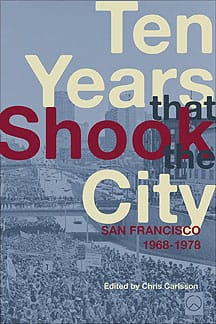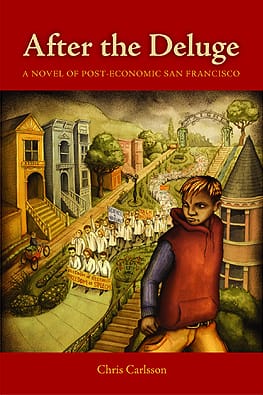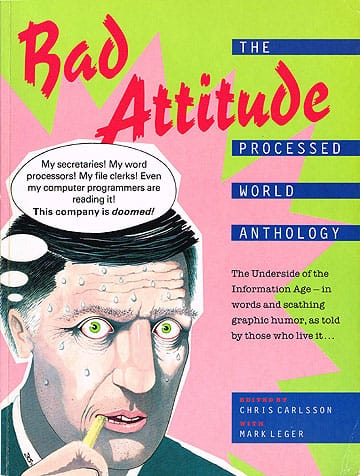Woke up yesterday to a glorious sunny, warm day, unusual for San Francisco in the summer, and after a cold fog last night, it’s beautiful again today. In the news yesterday I read a cyclist was killed by an SUV jockeying for position on a Los Angeles street, and in downtown SF a woman cyclist was run over (she died today) by a truck after she turned left in front of it. The dull routinization of slaughter that our transit choices depend on…
A few days ago SF police shot a guy ten times when he ran away from them after apparently evading his $2 bus fare in Bayview (there are conflicting claims about whether or not he was armed and whether or not he shot at the police, and now the police are claiming he shot himself!). Two nights ago a spirited anti-cop demo went roaring through the streets, leading to 35 arrests and a smattering of property damage. Some people produced a flyer (art below). I loved the banner in front of the march: “You can’t shoot all of us: Fuck the Police!” It is a deep insult to the social fabric of our daily lives that people are getting murdered by police for any reason, let alone something as petty as avoiding a bus fare.
I’m reminded of Peter Linebaugh’s magisterial “The London Hanged,” an incredible book in which he profiles several hundred individuals who were hung (by the neck) at Tyburn Gate in London between the mid-1600s and mid-1700s, the vast majority for stealing rather small amounts of “property” (often food). As Linebaugh shows, this was the time in capitalist and British history when the basic idea of the inviolability of property rights was being established, and it took a good deal of state-sanctioned murder to reinforce that new logic. Could it be that we’re living through an analogous process in which refusing to pay for small things like bus rides, or even petty shoplifting, is going to face much more severe punishment, even random death?
This, in turn, dovetails interestingly with an article I just read in the latest Mute called “Short Circuits: Finance, Feedback, and Culture” by Benedict Seymour. It’s a complicated essay that is making a difficult comparison between culture and finance. One of his arguments is that we’re living through an era in which capitalism is abandoning its historic role in supporting the cost of reproducing the working class (and the society that facilitates the accumulation of capital).
“Today we see expanding forms of ‘non-reproduction’, including: the annexation of labor-power outside the advanced capitalist countries through globalization; the bolstering of profits by paying workers less than the cost of their reproduction; the non-maintenance of infrastructure; the non-replacement of natural resources, etc.”
Seymour importantly brings the inquiry to the question of social media and networked economies, because these new forms (increasingly ubiquitous) generate huge amounts of free work by users, which then become monetized by online sites like Google, Facebook, etc. Finance capital, which expanded at a dizzying pace during the past decade or two, depends on promises of future production and future profits to justify the value of bonds, stocks, derivatives, and the whole fictional mess of “financial instruments.” But capitalist production has long depended on acquiring free inputs—environmental, infrastructural, and reproductive—and in that way presages the supposedly cutting edge co-optation of unpaid labor via the precarious labor processes of online and immaterial production. Culture and finance both depend on the current form of capitalist exploitation, annexing unpaid inputs from any and all sources, and importantly, refusing to pay for the costs of producing or maintaining those inputs (whether the natural environment or the cultural environment of a rich artistic scene). As Seymour cleverly puts it: “Culture and finance are increasingly interchangeable; finance is aestheticized as its claims become absurdly fictitious; culture is reduced to finance as its fictions become absurdly monetized.”
He hits an important point when he brings in the kinds of activities that I wrote about in Nowtopia, but sharply underlining the common failure to target value itself as the problem. (I wrote about this extensively too, as the problem of cooptation when interesting projects that seem to escape the logic of wage-labor and commodification eventually get absorbed as they become small businesses and/or dependent on nonprofit grants.) Seymour claims the neo-avant-garde of the 1950s and after saw “a route to a more autonomous and egalitarian cultural and social existence, a way of dissolving the hierarchical structures of a bureaucratized mass society, [but] the pioneers of cybernetic and network culture generally failed to target the Ur-form of feedback, that is, the value form per se.” Touting the gift economy and the cooperative, liberatory advantages of freely chosen activities outside of wage-labor is one path towards a kind of escape, but only a temporary and geographically limited one so far. Crucially, the enthusiastic embrace of coops, collectives, free DIY projects, etc., without a critical understanding of the role of “free” in the restructuring of the global economy leaves one open to reinforcing some of the worst dynamics we originally set out to overturn.
“An ethos of self-limited and self-sustaining activity, freed from the hubris of modernist teleologies of growth, linked to a notion of ‘generosity,’ ‘gift economy,’ and ‘DIY’ emancipation may (still) seem appealing. Yet, however militant the refusal of instrumental reason, linear time, progression, etc., this ethos predominantly operates by bracketing out the dull compulsion of the value form. This leaves it hostage to the kind of reappropriation now being conducted by the capitalism of the Big Society.”
This reappropriation is probably a bit more starkly visible in Britain, where municipalities and art bureaucracies are everywhere coopting artists and the “new creatives” into their schemes for urban renewal. But it has been super clear too in the realm of biofuels, a push from below against petroleum oil as the exclusive fuel for engines, but then rapidly co-opted by big agribusiness, government subsidies for ethanol, and the oil industry itself. Still, on this side of the pond it’s more about subtraction than absorption. Seymour again: “Capitalism as an open system is increasingly dependent on the annexation of the ‘outside’ in all its forms, and where this outside is definitively assimilated it must be recreated endogenously by the subtraction of existing social reproduction.” Can shooting fare evaders be seen as a particularly harsh version of a ‘subtraction of existing social reproduction’? Maybe that’s a bit of a reach… but if options for survival in the interstices of this culture’s vast wealth are being squeezed and shut down, that is a version of eliminating existing channels of social reproduction.
The harshness of state violence has grown in the past decade. The Patriot Act and its invasive provisions for state surveillance have given enormous powers to the spook bureaucracies. The Drug War, recognized as an abject failure in terms of any of its ostensible goals, is actually maintained not to stop drugs but to keep them coming, and the many lucrative businesses that depend on them—from the actual drug cartels and their bankers, to the police and spy agencies, to the hardware manufacturers servicing the prison-industrial complex. Inmates went on hunger strike in the California prisons in early July, generating a certain amount of support, but mostly ignored in the mainstream press. The radical expansion of incarceration at any public cost shows no real signs of abating yet. The fiscal crisis is being used as a blunt weapon to further degrade the lives of those who already suffer the most; no discussion of bloated military, police, and prison budgets is allowed in the frenzy to cut spending, only the services that poor people depend on, and the workers who provide those services.
It’s a dark period, no doubt. But the sun is out, and it’s remarkably easy for many people to go on living as though none of the darkness on which their lives depend really existed. Declinist narratives that see the current global crisis as the stage from which the U.S. finally exits its post-WWII hegemonic role are no comfort when you consider how the destruction of a social commitment to general well-being has succeeded ideologically—but even more harshly, materially. That Obama is the enthusiastic author of the coming round of cuts and reductions in the social wage is no surprise. Imagine the wrath of African Americans if a white president was pushing these attacks! Obama is the perfect guy to carry out the neoliberal, structural adjustments in the United States, given the demobilized, depoliticized working and poorer classes, and the guilty paralysis that besets white pwogwessives when it’s time to combat the war-mongering, torturing policies of the administration, not to mention its brazen catering to the agenda as set by the ultra-right. We’re actually going to have to put up with the sickening spectacle of a year-long frenzy of liberal imploring, urging us to vote for Obama because of how awful it would be if a Republican won… really? How different would it be? Wars have been expanded, CIA torture and kidnapping continue apace, and the military budget grows and grows… And now there’s Obama’s enthusiastic support for attacking Social Security and Medicare… what Republican president could’ve gotten away with that?
The (un)funhouse mirror world of U.S. politics is well demonstrated in the emergence of the latest Alice-in-Wonderland Talking Point by the Republicans, when representative after representative appeared in the media last week talking about the ultra-rich with one term only: “job creators”!! I’ve railed against jobs before (see “Jobs Don’t Work!” in The Political Edge), so I was pleased when I came across a link to this essay “Work, Production and The Common: A Provocation” on a South African blog. One of the recurrent problems with attacking the tired leftist demands for “jobs” or “work” is the inevitable rejoinder by sanctimonious leftists: “You can only say that because you have money, you’re privileged, you’re not hungry… etc. etc.” Not far behind those kinds of assertions quickly comes the racist argument that “It’s racist to be against jobs, because people of color are the most unemployed…” or some variation on that theme.
I hope that these arguments appearing in the context of post-apartheid, neoliberal South Africa will give them more credibility with the U.S. leftists who are so quick to resort to their tired clichés and old 20th century paradigms. The essay begins by recounting how the hopes of South Africans for a better life after the overthrow of apartheid have gone unmet. Mbeki’s administration did little to redistribute wealth and certainly did nothing to meet popular demands for “decent work.” The Jacob Zuma government continues the African National Congress’ ongoing embrace of neoliberal capitalism, with its commitment to private ownership, capitalist development, and trickle-down economics. Here are some choice excerpts from the essay:
“Labor struggles have constantly reminded the country’s rulers of how democratisation is supposed to be not just a procedural and constitutional matter, but also the fulfillment of popular demands of redemption of work, which past racial domination turned into a largely oppressive reality but unions tried to rescue as a condition of solidarity and empowerment. Social movements have, finally, made the “dignity of work”, and even the “right to work” a central ethical-political component in their demands for redistribution and recognition…
“Once “job creation” becomes the pinnacle of emancipative imagination, it becomes easy for [employers, liberal reformers, and assorted free marketers] to argue that a bad job is better than no job at. In this way, the labor market is naturalised as an objective law of social advancement, redistributive claims become pathological symptoms of “dependency”, and social conflicts are threats to prosperity and the expansion of employment. As the definition of “decency” ceases thus to be a matter of political contestation, the subsequent, consequential step is to assert that it is up to market conditions and the characteristics of the job itself to determine how “decent” it is allowed to be…
“Confronted with this impressive discursive slide, where the dignity of work is upheld to reinforce the centrality of the labor market in determining the measure and reward of life, indeed the very meaning of being human, the left’s concerns with “decent work” have fallen quite short of a convincing alternative narrative or a radically oppositional recasting of desire. Having failed to contest the multitudes’ meanings and values on the terrain of work and production, traditional left forces have rather fallen back on the state as the ultimate guarantor of fairness, development, and decency. And from the state the left has received further injunctions to rely on employment, and employment only, for any meaningful social inclusion and security, with no other considerations attached as to the conditions and remunerations of work, or the measures that can at least limit a complete domination of employment over life…
“We cannot think of the global decline of the twentieth century socialist and nationalist left(s), themselves a major factor in the neoliberal hegemony of the past forty years, without questioning the ways in which they have idealised employment and unquestioningly associated it with progress. Within this broader devastation in the terrain of political power relations and public discourse, the left’s attachment to “decent jobs” only reveals a comprehensive failure of imagination, of which the acceptance by progressive forces of a subordinate role in a game of which capital is writing the rules is consequential…
“It is time to ask, is “decent work” still a valid tool to criticise capitalism and oppose the disciplining of multitudes by market forces? Or is it time to finally realise that today employment-based claims and identity lead not to emancipation, but to renewed subjugation, repression, and reaction? Should we start placing liberation from, and not through capitalist work at the core of new languages and grammars of politics, which uncompromisingly break with the legacy of the twentieth century left(s)?”
Yes! Let’s get on with it! And not to turn to the right, or the miserable chimera of the ‘center’ as endlessly trumpted by (the often very funny) Jon Stewart. Who are the mysterious “centrist” voters who now find themselves between the palpable, frothing insanity of the ultra-Right and the head-in-the-sand, business-as-usual Right, where all discussion of human liberation and social transformation are dismissed out of hand as the ravings of unrealistic loonies? Why is the Left in the U.S. so completely irrelevant and incapable of articulating anything that actually addresses the multiple crises of economy, ecology and social anomie? I’d say its fixation on “Jobs” is one of the main reasons.
Let’s end today with a last paragraph from The Tribe of Moles in South Africa:
“…another question: does the irrelevance of employment to a politics of liberation mean that production-related struggles are no longer worth fighting for? Our response is an emphatic “no”, but on condition of profoundly redefining what we mean by “production”. In other words, “production-related” can no longer simply mean “workplace-based”. Workplace struggles are, for sure, still important in affirming the autonomy of life and the common from the dictates of the market, for example through demands for wages and benefits that are impossible to meet in terms of productivity, therefore subverting wage labor from within. But struggles for production especially imply for us the production of social relations and political possibilities that emanate from the power of the common as it manifests itself across the social and the everyday. They hint, in other words, at the production of subjectivity and the refusal of the modalities of subjection along which capital and government want to align conducts and values. We are referring here not only to subjectivities premised on waged employment and the consumption of commodities but also to their correlates in the institutional sphere: liberal democracy and the idea of the individual rooted in property and market relations as the only legitimate carrier of socio-political agency.”













Leave a Reply